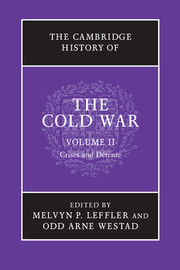Book contents
- Frontmatter
- 1 Grand strategies in the Cold War
- 2 Identity and the Cold War
- 3 Economic aspects of the Cold War, 1962–1975
- 4 The Cuban missile crisis
- 5 Nuclear competition in an era of stalemate, 1963–1975
- 6 US foreign policy from Kennedy to Johnson
- 7 Soviet foreign policy, 1962–1975
- 8 France, “Gaullism,” and the Cold War
- 9 European integration and the Cold War
- 10 Détente in Europe, 1962–1975
- 11 Eastern Europe: Stalinism to Solidarity
- 12 The Cold War and the transformation of the Mediterranean, 1960–1975
- 13 The Cold War in the Third World, 1963–1975
- 14 The Indochina wars and the Cold War, 1945–1975
- 15 The Cold War in the Middle East: Suez crisis to Camp David Accords
- 16 Cuba and the Cold War, 1959–1980
- 17 The Sino-Soviet split
- 18 Détente in the Nixon–Ford years, 1969–1976
- 19 Nuclear proliferation and non-proliferation during the Cold War
- 20 Intelligence in the Cold War
- 21 Reading, viewing, and tuning in to the Cold War
- 22 Counter-cultures: the rebellions against the Cold War order, 1965–1975
- 23 The structure of great power politics, 1963–1975
- 24 The Cold War and the social and economic history of the twentieth century
- Bibliographical essay
- Index
- References
17 - The Sino-Soviet split
Published online by Cambridge University Press: 28 September 2010
- Frontmatter
- 1 Grand strategies in the Cold War
- 2 Identity and the Cold War
- 3 Economic aspects of the Cold War, 1962–1975
- 4 The Cuban missile crisis
- 5 Nuclear competition in an era of stalemate, 1963–1975
- 6 US foreign policy from Kennedy to Johnson
- 7 Soviet foreign policy, 1962–1975
- 8 France, “Gaullism,” and the Cold War
- 9 European integration and the Cold War
- 10 Détente in Europe, 1962–1975
- 11 Eastern Europe: Stalinism to Solidarity
- 12 The Cold War and the transformation of the Mediterranean, 1960–1975
- 13 The Cold War in the Third World, 1963–1975
- 14 The Indochina wars and the Cold War, 1945–1975
- 15 The Cold War in the Middle East: Suez crisis to Camp David Accords
- 16 Cuba and the Cold War, 1959–1980
- 17 The Sino-Soviet split
- 18 Détente in the Nixon–Ford years, 1969–1976
- 19 Nuclear proliferation and non-proliferation during the Cold War
- 20 Intelligence in the Cold War
- 21 Reading, viewing, and tuning in to the Cold War
- 22 Counter-cultures: the rebellions against the Cold War order, 1965–1975
- 23 The structure of great power politics, 1963–1975
- 24 The Cold War and the social and economic history of the twentieth century
- Bibliographical essay
- Index
- References
Summary
By 1962, the once robust Sino-Soviet alliance had cracked up, revealing serious conflicts beneath the façade of Communist solidarity. This split was a remarkable development in a Cold War context. It was not the first time that the Soviets had fallen out with their allies: the Yugoslavs were thrown out of the “camp” in 1948; Hungary had tried but failed to leave in 1956; Albania quarreled with Moscow in 1961. But, in spite of their intrinsic importance, these issues were small compared to the red banner of Sino-Soviet unity, the symbol of the power and appeal of socialism worldwide. The demise of the alliance represented the broken promise of Marxism. Ideological unity and conformity were so essential to the Soviet-led socialist world that a quarrel between its two principal protagonists – the Soviet Union and the People’s Republic of China – undermined the legitimacy of the socialist camp as a whole, and of the intellectual notions that underpinned its existence.
So inexplicable did the split appear from a Marxist perspective that both Chinese and Soviet historians in retrospect would blame the debacle on the other side’s betrayal of Marxism. But from a realist perspective, Marxism had nothing to do with the rift: the Soviet Union and China were great powers with divergent national interests. No amount of Communist propaganda could have reconciled these competing interests, so it was not surprising, indeed it had been predictable, that the Soviets and the Chinese would fall out and the alliance would crumble.
- Type
- Chapter
- Information
- The Cambridge History of the Cold War , pp. 349 - 372Publisher: Cambridge University PressPrint publication year: 2010
References
- 12
- Cited by

